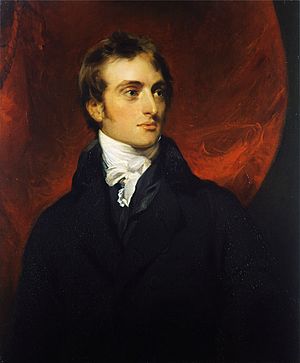Codrington Edmund Carrington facts for kids
Quick facts for kids
Sir
Codrington Edmund Carrington
|
|
|---|---|

Codrington Edmund Carrington, 1801 portrait by Thomas Lawrence
|
|
| 1st Chief Justice of Ceylon | |
| In office 1801 – March 1806 |
|
| Preceded by | Position established |
| Succeeded by | Edmund Henry Lushington |
| Personal details | |
| Born | 22 October 1769 Longwood, Hampshire |
| Died | 28 November 1849 (aged 80) Exmouth |
| Alma mater | Winchester College |
Sir Codrington Edmund Carrington (born October 22, 1769 – died November 28, 1849) was an important English lawyer and judge. He became the very first Chief Justice of Ceylon, which is now the country of Sri Lanka. He also served as a Member of Parliament in the United Kingdom.
Contents
The Life of Sir Codrington Carrington
Early Years and Becoming a Lawyer
Codrington Edmund Carrington was born in Longwood, Hampshire, England, on October 22, 1769. His father, also named Codrington Carrington, owned an estate in Barbados.
Young Codrington went to a famous school called Winchester College. After school, he studied law and became a lawyer, or "barrister," in 1792.
That same year, he traveled to India. There, he worked as a lawyer for the East India Company in a city called Calcutta. He even met another famous person, Sir William Jones, who was a judge and scholar.
A Judge in Ceylon
In 1799, Sir Codrington had to return to England because he wasn't feeling well. But his legal skills were still needed!
In 1800, he was asked to help create a new set of laws for Ceylon. Ceylon was a British colony at the time. After he finished this important work, he was chosen to be the first-ever Chief Justice of Ceylon's new court system.
Before he sailed to Ceylon, he was given the title "Sir" by the King. This meant he was knighted for his important work.
Life Back in England
By 1806, Sir Codrington's health problems continued, and he had to leave his job in Ceylon. He decided not to take any more jobs in colonies far away.
He bought a large property in Buckinghamshire, England. There, he became a local judge and a deputy-lieutenant. He spent many years leading the local court meetings.
Sir Codrington also received many honors. He earned a special university degree called a Doctor of Civil Law (DCL). He was also chosen to be a Fellow of the Royal Society and a Fellow of the Society of Antiquaries of London. These are groups that recognize important people in science and history.
From 1826 to 1831, Sir Codrington was elected as a Member of Parliament for an area called St. Mawes. This meant he helped make laws for the country.
In his later years, he lived mostly on the island of Jersey. Sir Codrington Edmund Carrington passed away in Exmouth on November 28, 1849.
His Writings
Sir Codrington also wrote several books and pamphlets. After some riots in Manchester in 1819, he wrote a book called Inquiry into the Law relative to Public Assemblies of the People. This book looked at the laws about people gathering together in public.
He also wrote a Letter to the Marquis of Buckingham on the Condition of Prisons in 1819. This letter shared his ideas on how prisons should be run. He wrote other small books on different topics too.
 | Sharif Bey |
 | Hale Woodruff |
 | Richmond Barthé |
 | Purvis Young |

